Writing my Master’s Thesis in Kraków
- Physics M.Sc.
- Poland, Kraków
- Uniwersytet Jagielloński
- 09/2024 – 06/2025
1. Application/Finding an internship
I became aware of the Erasmus+ internship because I wanted to return to the research group where I had already written my Bachelor’s thesis for my Master’s thesis. Unfortunately, it was not possible to write my Master’s thesis there. The group leader therefore suggested that I ask one of the cooperation groups in Lübeck or Krakow whether they could offer me an internship to write my thesis there. So that’s what I did.
I chose Krakow because I had already studied in Aachen for a few years and wanted to get to know another country. I had also wanted to learn a Slavic language for a long time, so Poland was an obvious choice.
The application process was quite straightforward overall, as I already had contacts in Krakow. The whole thing was quick and easy to organize, especially as the local group was happy to provide support. It was therefore not necessary for my university to help me find an internship; I was supported by my former research group.

©Phillippe Clement
2. Accomodation & Living expenses
During my stay in Krakow, I lived in an apartment that I looked for myself. However, it wasn’t easy to find an apartment, as most of the platforms are in Polish. If you only speak English, the choice is much more limited. So I was all the luckier: I found a well-located apartment that was in good condition. My landlord had also grown up in the USA and spoke fluent English, which made things a lot easier.
It is generally more difficult to find a suitable apartment in English. Many offers that are suitable for international students are either very outdated (e.g. apartments with a coal stove in the living room) or simply overpriced.
The cost of living in Krakow is generally lower than in Aachen. As far as food is concerned, I would say that the prices are roughly comparable to Germany. However, eating out is much cheaper and leisure activities are also usually affordable. Public transportation is well developed. However, there is no equivalent to the Deutschland-Ticket for students – instead you get a 51% discount on tickets.
3. Everyday life/ the internship
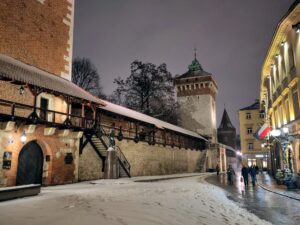
©Phillippe Clement
During the week, I went to university to work on my Master’s thesis. I also took some courses at the Jagiellonian University, which were not directly part of the Erasmus program, but were of great interest to me. The atmosphere at the university was very pleasant, open and collegial. There were only occasional minor problems in the administrative area, as not all staff speak fluent English. In such cases, I had to rely on the support of my supervisor, who helped me a lot.
In terms of content, I worked with neural networks as part of my Master’s thesis. Roughly speaking, the aim of the research group is to develop a detector that can be used in the field of proton therapy, a precise form of radiotherapy for cancer, in order to improve the accuracy of the treatment. In the process, I gained a lot of new knowledge, especially in the areas of machine learning, data structures and the application of ROOT, a widely used data analysis framework in physics.
The collaboration with my colleagues on site was relaxed and pleasant, which made the work much easier. The main language of communication in the lab and in the office was English, as Polish is quite a demanding language and I couldn’t speak much myself yet. Nevertheless, I took the opportunity to learn a little Polish to help me settle into everyday life.
4. Free time/tips
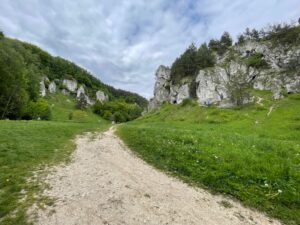
©Phillippe Clement
In my free time in Krakow, I had an incredible number of opportunities to be active and enjoy nature. Right next to the campus is a disused quarry with crystal-clear water, a popular place for swimming and relaxing. You can also climb the surrounding rock faces nearby. In general, the region around Krakow offers many opportunities for climbing, as the so-called “Polish Jura” stretches between Krakow and Częstochowa, a limestone mountain range with an impressive landscape.
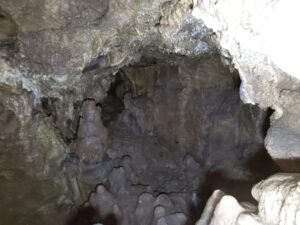
©Phillippe Clement
In addition to climbing, I also went on several hikes. I found it particularly exciting that there are officially designated places in Poland where you can camp in the countryside. This means you can go on longer hikes at the weekend and spend the night in the forest along the way. There are also a number of caves in the area to explore.
In terms of social life, I was very lucky to meet many international people, some of whom were Erasmus students, but also others who live or study in Krakow independently of the exchange program. As a result, I have built up a broad international network. The students at the university are mostly of Polish origin, but among the doctoral students there are many from South Asia, and I met some very nice people from India and Iran.
5. Conclusion
I take an incredible amount from my time in Krakow, both professionally and personally. On the one hand, I was able to work on exactly the research project I was interested in and gain valuable experience in the field of machine learning and detector physics. On the other hand, I started learning Polish and immersed myself in the culture.
I have not regretted the decision to go to Poland for a second, on the contrary: I am happier here than in any other place I have lived before. So much so that I have decided to stay in Krakow for a while after I graduate.
I can recommend an Erasmus+ internship without reservation, not only to learn something new professionally, but also to step out of your comfort zone, gain new perspectives and make international contacts. You learn a lot in a very short time when you suddenly move to another country with a different language where you hardly know anyone. Especially with regard to your own career, such a stay abroad can be enormously valuable, and this experience definitely looks good on your CV.
Writing my Master’s Thesis at the UCL
- Environmental Engineering M.Sc.
- United Kingdom, London
- University College London
- 09/2024 – 03/2025
Application
In January 2024, I applied to AVT (Aachener Verfahrenstechnik) at RWTH for an external master’s thesis at University College London (UCL). The AVT offers not only Erasmus places for process engineering students, but also external master’s theses at partner universities. I was particularly interested in topics related to fuel cells and water electrolysis, and looking through the partner universities I found out that I could combine research in this field with living in one of my favourite cities in Europe! After my successful application to AVT, I was put in contact with the exchange student coordinator at UCL’s Department of Chemical Engineering to find a topic and a supervisor. From UCL side, I had to apply as an undergraduate exchange student to be part of the official exchange student programme, even though I wouldn’t be taking any courses but would be working full-time in the labs. For this application I had to take an IELTS language test and submit a letter of recommendation, which was provided by the Erasmus team at AVT. After an online interview with one of the Associate Professors of the Electrochemical Innovation Lab (EIL), I decided on a preliminary topic for the thesis. Once these steps were completed, I was able to apply for my Erasmus+ internship grant and my UK visa.
Accomodation & Cost of Living

The view from my room in Camden ©Bia Brandt
As much as I love London, finding affordable accommodation can be challenging. UCL offers accommodation in the university’s halls to first year and exchange students. Accommodation in the halls is much more expensive than renting a room in Aachen, but still a good price for London. As I had already lived in London for an exchange semester during my undergraduate degree, I was not eligible for halls accommodation and spent my first two weeks in London looking for private accommodation. Especially in September a lot of people are on the lookout for a room as the university year is just starting. For my search I used Facebook groups and a website called Spareroom. Often rooms can only be rented on a yearly basis and for council tax reasons it is easiest for students to find accommodation in shared flats with other students. As well as finding rooms to rent, you can also use Spareroom to get in touch with other people who are looking for rooms. I went to a few flat viewings with a group of UCL students I had met through Spareroom. We didn’t end up renting together, but we remained friends for the rest of my time in London. The room I rented in the end was a six-month sublet in Camden and cost £950 a month. The area was great to live in (my favourite spot is Regents Canal) and I was spared many hot, stuffy and expensive tube rides as I could take the bus to UCL ☺️
Not only the rent, but the cost of living in general is a lot higher than in Aachen. Public transport is expensive, especially the tube if you use it regularly at peak times. Food in the UCL cantine costs ~£6 per meal (I always meal prepped as most of the students did). Also, there was a Lidl close to UCL where I usually did my shopping as the food is very reasonably priced there. There is an endless amount of things to do in a city like London. While eating out or going to the pubs will cost you a small fortune there are also things that can be done for free, as for example many of the museums. I can recommend the British museum which is just down the road from UCL, making it possible to visit the Rosetta stone during a lunch break.
Master’s Thesis in the EIL Labs

London at night ©Bia Brandt
On a day-to-day basis, I arrived at UCL around 9am and started working in the EIL labs. Mostly PhD students and research fellows work in the EIL labs and from the beginning I was part of the team and shared an office with the group. Compared to my previous research experience in AVT, I worked much more independently with different PhD students helping me where my research overlapped with theirs. I had a lot of freedom in where to go with my Master’s thesis, which was a very valuable experience, but also challenging at times. The labs and the work were sometimes a little less structured than I was used to in Aachen. However, everyone there was very helpful, especially in the first few weeks and when I was collecting my equipment, which was very valuable. Even though I was there for a Master’s thesis, I was treated like a PhD student, with bi-weekly meetings with one of the academic leaders of the group. I was not the only international visiting the EIL labs, there were two PhD students on a six-month visit for the same period as my Master’s thesis. Towards the end of my stay, another Masters student joined the EIL group for a research project. Overall, I felt very welcome in the group and even though I was the only one doing a Master’s thesis, it felt very easy to connect and spend time with the others both inside and outside of the labs.
Life at UCL & in London

Weekend walks along Regents Canal ©Bia Brandt
Needless to say, living in London is amazing! Over the course of my Master’s thesis I always took the weekends oft to enjoy the city. There is so much to do and even though I have spent 6 months doing all the touristy and not so touristy stuff, I still have things on my list. One of my favourite activities in London is to just walk around the streets or drive around in the red double decker busses as there is always something interesting to see.
Something I particularly enjoyed about studying at UCL is the societies. UCL has a very vibrant student community, and everyone can be part of it. When I went to the society fair at the beginning of my stay, I learned that there is a society for every hobby imaginable (ranging from a Taylor Swift Society to the Bubble Tea Society). I decided to join the Dance Society, the Hiking Society and the Photography Society (joining is very easy, you just need to pay ~£10 at the beginning of the semester to become a member). Joining the societies meant my calendar was full of social events from week one, but of course it took a bit longer to actually get to know the people in the societies. The society I enjoyed the most in the end was the Photography Society. How often do you get the chance to meet up with models (students from the modelling society) in a park in the middle of London and do a spring photo shoot as an amateur photographer?
Conclusion
The past six months have been incredibly intense, full of visits from old friends while making new friends. I had a steep learning curve academically through working more independently than I have before but also got the chance to dive into a more creative world through the societies and meet people who study something completely different from me. All of this in the setting of a huge and chaotic, yet also very beautiful city. Even though it took a lot of time to prepare and was an expensive time abroad, I am very glad I spent these six months in London ♡
Master Thesis in Finland in Winter – Is That Something for You?
- Product Development M.Sc.
- Finland, Oulu
- Oulun Yliopisto
- 11/2024 – 05/2025
Hello,
my name is Eileen, and I’d like to tell you a bit about my time here in Finland and hopefully inspire you to come and experience Finnish nature during wintertime.
I wanted to write my Master’s thesis in Oulu because my Finnish boyfriend lives and works there. I had already visited Oulu a few times during different seasons. Typically, the snowy season lasts from around November to May, but of course, this can vary quite a bit from year to year. Winters here are much darker and colder than in Germany, but I guess that doesn’t surprise anyone. It can get extremely cold – temperatures of -20°C are quite common in Oulu, since it’s only about 200 km south of the Arctic Circle. This means that in December, the sun barely rises at all, but on clear days, you can sometimes see a beautiful pink sky in the late afternoon.
I used to think I didn’t like winter, but winter in Oulu is very different compared to North Rhine-Westphalia. There are many fun winter activities like ice skating, skiing, and of course: sauna, which make this season really enjoyable. Most Finnish schools have ice rinks in winter that are free to use – you just need your own skates. Oulu also has many cross-country skiing trails that are maintained by the city. These are free to use and usually run through the forest. One side of the trail is prepared for classic skiing, and the rest can be used for skate skiing. I believe it’s also possible to rent skis, although I haven’t tried that yet. Another good option is to check out Finland’s version of eBay, called Tori, for used equipment. If you’re into downhill skiing, there are several ski centers a few hours away from Oulu that you can reach by car. Having a car in winter can be very useful. Finnish cars usually have studded winter tires, and parking spots often have outlets to plug in car heaters that warm up the engine before you drive. It is possible to bring your own car to Finland, but you should feel confident driving in winter conditions and make sure to get proper Finnish winter tires.
There are a lot of saunas in Finland, and it’s very likely that your apartment building will have a shared sauna that you can book. If not, going to a swimming hall is a good and affordable alternative – the sauna is usually included in the entrance fee. There are also river saunas where you can try ice swimming! If you’re more into indoor activities, Oulu also has climbing gyms and a trampoline hall. And of course, winter is the season to hunt for the Northern Lights, especially from November to March. They can be stunning, but you might have to wait a few weeks for clear skies. You can use a Northern Lights app to track when and where they might appear. Do not be disappointed, they always look brighter in pictures than in real life. Oulu also has an ice hockey team called Kärpät, and going to a game is definitely worth it! There are many beautiful national parks you can visit, such as the Little Bear’s Trail, which is lovely year-round but gets crowded on summer weekends because it’s the most popular trail in Finland. A bit closer to Oulu is Syöte National Park, which is easier to reach by car, though I think buses are available too. Many national parks have free huts where you can sleep, and you can check the maps on the Luontoon website. Depending on your route, it can be helpful to have snowshoes for winter hiking, or you can use skis if you have them.
Public transportation in Oulu is available, but the city also maintains its bike lanes year-round, so if you’re comfortable biking in the snow – as many Finns are – you can do that too. You can even get winter tires for your bike for better grip.
There aren’t many big cities near Oulu, but you can take a train north to Rovaniemi to visit Santa Claus. A few hours south by train is Tampere, a large city by Finnish standards. You can also visit the Ranua Zoo, which has many animals native to Finland.
Oulu itself has only a few sights in the city center, and half a day is enough to see them all (such as the policeman statue, the market hall, the main church, the free city museum, and the harbor). In winter, you can even walk on the frozen Baltic Sea, which connects some of the islands to the mainland. At the moment many sights are under construction, because Oulu is will be the European Capital of Culture of 2026.
Culture
The Finnish people I’ve met so far have been very open and friendly. While people in Nordic countries are often said to be more reserved – which is true to some extent – joining a sports club is a great way to meet locals. I joined the fencing club in Oulu, and they’ve been super friendly and welcoming, they also welcome beginners.
In general, people here are more relaxed than in Germany, and you usually thank the staff when leaving a store, which I really like. Because of the long dark winters, alcohol consumption is more strictly regulated than in Germany and also more expensive. Beer and low-alcohol drinks can be bought in supermarkets before 9 p.m., but for stronger alcohol, you have to go to a special store.
Language
No need to speak Finnish at all – English of course is enough here in Finland!
Living Costs and Organization
I sent my CV and a cover letter to the University of Oulu to find a thesis position in the mechanical engineering department. One of the professors then set up an online interview, and that was all I needed for the application process. After that, I searched for a supervising institute at RWTH, which was very easy and didn’t take much time.
Living in Finland is more expensive than in Germany, especially if you want to eat out. However, the University of Oulu pays you for writing your thesis there. In addition, you can apply for an Erasmus Traineeship Scholarship. You should apply for Erasmus at least six weeks before your internship starts.
The University of Oulu has a website for foreign workers that explains all the organizational steps you need to take – you can use this even if you’re writing your thesis for a company. However, it might not be possible to write your thesis for a company at all, depending on whether you can find a supervising institute at RWTH.
Flying or Taking the Train?
I usually fly to Finland, because taking the train is very time-consuming, just as expensive as flying, and quite exhausting. But if you have time, it could be a nice experience: you can go by train to Copenhagen from Hamburg, then on to Stockholm, and take a ferry to Finland (from Stockholm or Uppsala). This is a great way to avoid flying and see some cities on the way. There are also night trains you can take in Denmark or Sweden.
When I fly, I usually go to Helsinki, and from there, I either take the train (possibly a night train) or a domestic flight to Oulu. From Oulu airport, you can take a bus or taxi into the city. In winter, flying to Rovaniemi or Kittilä and taking the train from there to Oulu might also be a good option. You can check train schedules on the Finnish railway website [VR].
Final Thoughts
I would definitely recommend Finland as a destination for your Master’s thesis if you enjoy winter sports, hiking, and nature – and if you’re confident that you can make friends here, for example through sports clubs or among Erasmus students at the university. Otherwise, the long and dark winters might be difficult to enjoy.

©International Office
My experiences at Volvo Technology
- Energy Engineering M.Sc.
- Sweden, Göteborg
- Volvo Technology
- 10/2024 – 05/2025

Masthugget Church Viewpoint East ©Marc Müllenbach
Hello, my name is Marc. I am a German studying Master Energy Engineering at RWTH Aachen University, Germany, and participated in a research stay funded by the Erasmus+ Internship program during my master’s thesis at Volvo Technology – one of the most Swedish companies imaginable – in the second largest city Göteborg, Sweden. Getting this opportunity, to work on practical research in a company, was very difficult and almost did not work out. I started applying more than a year ahead, but this was way too early for most cases. In Sweden, there are no mandatory internships of up to 6 months; Swedish students gain practical experience during their summer break. Yes, you heard right: all students have a 2-3 month study-free period during the summer, without the need to prepare for exams, since they finish them before Midsommar (the summer solstice). Their internship culture comes from the fact that students do not receive their student funding during vacation, so many rely on summer jobs to survive financially until the next study period. Because internships are limited to these three months, companies don’t know about longer internships, especially not outside this period, as is common in Germany. Another aspect is that thesis work usually starts in January, as Swedish studies are separated into four periods, and are mainly carried out in groups of two—eliminating most chances if you want to start according to the German semester dates and alone. However, you would not be reading this if I hadn’t made it despite the low chances. I applied a lot, sent unsolicited applications to companies, connected with people on LinkedIn, and sent dozens of requests for an internship with the opportunity to follow up with a master’s thesis, which is usually the catch in Germany. The position was acquired via an unsolicited application to an industrial PhD student in cooperation between Chalmers University of Technology and Volvo Group, which led to the position at Volvo Technology. Other research internships would have been possible at Chalmers, but the research topic and work environment at Volvo were the best option.
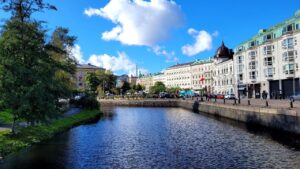
Moat of the old city fortifications, Bazarbron ©Marc Müllenbach
Finding a suitable accommodation without being registered as a Swedish student brings further problems, since you are not eligible for student accommodations. Some shared living opportunities always exist but are highly requested and not available in sufficient quantity. Some international students even live in hotels or cabins for the first year. In Swedish metropolitan areas, housing agencies require you to be in the queue for several years. Even colleagues at my workplace, who were in the queue for up to three years, were not able to find suitable accommodation (for their living standard) and ended up buying instead. I found mine with a lot of luck on Facebook (which is widely used in Scandinavia and also serves as an online marketplace and for international exchange). The accommodation had two rooms, one bedroom, and one living room/kitchen. The monthly costs were approximately €450 per person, with all additional costs included. I lived there with my girlfriend, who also studied at Göteborg University. For grocery shopping, I highly recommend using “Too Good To Go,” which offers a full bag of vegetables close to expiration for under €5—this saves money since vegetables and fruits are noticeably more expensive compared to Germany. Monthly expenses for groceries were roughly €200 per person, including all food and household costs and eating out every two weeks. Since the canteen at Chalmers was €6 (student) or €8 (visitor), and at Volvo Group €10, I decided to always prepare my own food, which is popular in Sweden. There are always spaces with microwaves and cutlery. For transportation, you can use rental bikes for €30 per year (Nextbike/Sty&Ställ). Since I needed to get to the other side of the harbor to Göteborg Lundby, I bought a tram ticket, which was €60 (student) or €75 (non-student) per month. Even though I was a student, I couldn’t use the student discount for many occasions, since in Sweden your student status is verified by a “Mecenat” app account issued by a Swedish university, which I did not have.
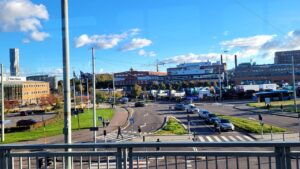
Volvo Group, Gropegårdsgatan 10 ©Marc Müllenbach
Everyday life during the research stay was a 40-hour workweek, starting at 9:00 and ending at 17:00. It is common to have a one-hour lunch break at 11:00, which I always spent with coworkers. Since I started in October, I was the only student at the company until January, when two other thesis workers joined, as is usual during this time. From Volvo, I received a laptop for my research work, which was mainly self-guided and supervised by weekly meetings with my supervisor. I highly enjoyed short coffee breaks with colleagues around 14:00-15:00, called “fika,” to discuss technical topics or daily life. There was one 30-minute fixed slot per week where the whole department met, and one colleague always brought sweet pastries or cake. The department worked great as a team, and I think this weekly contact, as well as spontaneous meetings on other days, helps with teambuilding. I also enjoyed that Volvo Group is an international environment, and you can get into contact with everyone on a casual basis since in Sweden you always call people by their first name; titles and positions do not mainly define your personality.

Vrångö Island ©Marc Müllenbach
During the winter, I came home from work when it was already dark, but there are many options available. Monthly sports membership at “Fysiken” cost €33 per month (3-month period) for students, including gym, courses, team play, and climbing/bouldering. I used to go every second day and made friends during climbing and basketball. It seems much easier to make international friends, as Swedish students usually already have their friend groups. Getting into those groups takes time and is comparable to making friends in Germany. With friends found that way, at the company or through international university programs such as ESN, you will definitely find people to spend time with—though more likely internationals who will leave after six months. However, Göteborg is a city where you can spend your time at many places, such as bars with after-work discounts and pub quizzes, museums, or at the ice hockey arena watching “Frölunda HC.” Around February, you will get home when it is still bright outside and can spend the sunset at famous places such as “Skansen Kronan.” On weekends, I recommend visiting the local historical
amusement park “Liseberg,” the islands in the archipelago near Gothenburg, one of the beaches, or hiking around lakes such as “Delsjön.” Trips around Sweden to Stockholm, Malmö, Helsingborg, or even Oslo in Norway are easy to do on a small budget. ESN also offered a one-week trip to Swedish Lapland, which everyone recommended to me, but I was quite
occupied by research work and also took vacation to visit my family over Christmas.
In conclusion, I liked Swedish culture before, and this trip increased its attraction. Sometimes it was tough to receive the same rights as locals, since you always need digital proof such as Swedish student status (“Mecenat”). For foreigners, it is also impossible to buy at a local food market or farm since “Swish,” the Swedish version of PayPal for payment, requires a Coordination Number for a Swedish ID, a Swedish bank account, and BankID. There are also several special days with traditions such as St. Lucia around Christmas, Valborg/Walpurgis Night and Swedish National Day in spring, and Midsommar in summer. However, my girlfriend and I decided to continue our time in Sweden and enjoy one or more summers at the coast and in nature, where Sweden has much to offer.
Becoming a Commercial Diver at NYD
- Maschinenbau B.Sc.
- Norway, Fagerstrand
- NYD (Norsk Yrkesdykkerskole)
- 11/2024 – 03/2025
Diving has been a life long passion of mine and thanks to Erasmus+ I had the chance to combine it with my studies in mechanical engineering to go to Norway for four months to become a Commercial Diver at NYD (Norsk Yrkesdykkerskole).
I got to spend a beautiful winter across the Fjord from Oslo in a small town called Fagerstrand filled with around sixty upcoming and eager divers from all around Scandinavia and the world.
The first two weeks were the basic theoretical foundation for diving: physics, medicine, first aid, seamanship, usage of diving equipment, fire hazards, decompression tables and pressure related effects of breathing gases. Everyday we learned about new subjects and gathered in groups to study and work on the assignments.
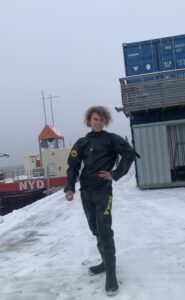
©Andreas Pietzcker
Before we could start diving we had to pass a medical check, fitness tests and a chamber dive to 50 meters to test our nitrogen tolerance. Breathing nitrogen at high pressures leads to the so called Nitrogen Narcosis or „Rapture of the Deep“. Usually the symptons set in at 30m and feel a bit like being drunk. The narcosis gets stronger the deeper you go (divers call this the Martini effect), so naturally at 50 meters we were in quite a cheerful mood. The air felt viscous due to the high pressure, you felt the high breathing resistance and most notably it changed your voice, making all of us sound like Donald Duck.
So naturally we sat in the cramped chamber bursting with laughter.
The first day of diving was filled with excitment. New equipment, check lists, for a few of us the first time they would ever get to experience the feeling of weightlessness underwater. I had been diving since I was twelve but this was a whole different world for me. Our equipment weighed in at around 30 kilos and we were glad when we climbed down the ladder into the water and could finally float.
Then we practized our bouyancy, an essential skill, to maintain a neutral position and neither sink nor ascent to the surface uncontrolled. We learned how to rescue an unconscious diver and bring him back safely, how to operate the winch to heave him out of the water and get him on a stretcher to perform first aid.
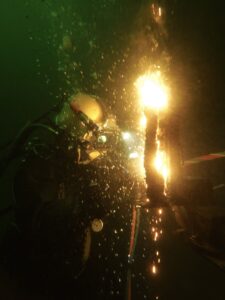
©Andreas Pietzcker
We were diving from Buldra, a dynamic positioning vessel (DPV) which uses it’s thrusters to maintain a fixed position in the water with pinpoint accuracy allowing divers to work safely. After a week of familiarizing ourselves with the equipment we took Buldra out to sea and dove from the wet bell. The wet bell uses the same principle as the first diving bells; it creates an air pocket within the bell with an open bottom, which allows divers to leave and return. In case of equipment failure the air pocket is our safe haven. During these dives we performed several inspection tasks on the bell, checking for example the electrical connections or the shakles used to attach the bell to the guide wires. The deepest dive with the wet bell was to 27m.
The next two weeks we learned about diving from the dry/closed bell and the transfer under pressure. The difference between the wet bell and the dry bell is, that on the dry bell we have a hatch which allows us to seal the bell on the bottom and maintain the bottom pressure while the bell is going up to the surface, whereas the wet bell’s pressure is always equal to the surrounding pressure.
The advantage is that the divers can be safely transferred under pressure (TUP) to a surface chamber, where they can decompress. The closed bell is used for deeper dives and saturation diving. On the station our worktask was to assemble different pipes using flanges to build a simulated distribution block for oil.
We learned about rigging and operating whinches. Underwater we guided them into place by making fine adjustments with a chain hoist and carefully positioning each part. We made sure the connection would not leak by using rubber gaskets and then screwed the pieces together using bolts. Especially important for making a good connection was the proper tightening of the bolts, where we did several passes tightening them little by little and always crosswise to make sure the pipes were properly connected.

©Andreas Pietzcker
Then we learned the use of lifting bags. Our goal was to lift a steel structure weighing about one metric ton. To figure out the weight we dove and took measurements of all the H-beams that make up the steel table. We worked out a total weight of nearly 950kg.
To prevent an uncontrolled ascent of the load we first rigged the table to a so called dead-mans-anchor. If we would fill the lifting bag to its total capacity the load would rise to the surface uncontrolled, where the bag would turn over, dump the air and come crashing down onto the divers. The dead mans anchor prevents this. This is just one example of the many things we learned about proper rigging, how to connect shackles and make sure they are loaded properly.
We filled the lifting bag and when we saw to table beginning to rise we could lift it with our bare hands and move it along the seabed.
We were also working on the pillars that make up the pier. We constructed a wooden frame underwater to be able to pour concrete. For the frame we cut 2×4 wood pieces into the correct length and profile of the bottom. To install rebar we used a pneumatic rock hammer drill to drill into the granite seabed. One diver operated the drill and the other diver guided the tip of the drillbit using a so called “Sea mans wife”. The drill we used uses around 60 liters of air per second. Which meant a whole lot of bubbles for us which made it rather difficult to see where we were drilling.
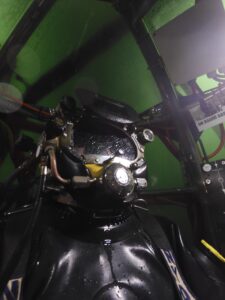
© Andreas Pietzcker
We learned how to use the AH3 and AH5 (air hat) free flow helmets. Their design is based on the old diving helmets like the Siebe Gorman whose history stretches back over a century. The difference of a free flow helmet is that there is a constant supply of air to the diver instead of a demand system, where air is supplied only when the diver breathes.
The helmet is connected to the dry suit and excess air has to be dumped with a valve that can be operated by pushing it with the side of your head. Again we were working on the concrete pillars, excavating and cleaning away the surrounding seabed to expose the bedrock. For cleaning we used an air lift which sucks away material using a difference in pressure and high and low pressure water jets as well as shovels to move material.
At around 15m there was an old steel tank which had been encrusted with barnacles and other types of sea life. We cleaned the tank using a hydraulic brush and got it nice and shiny again. As you would have expected of a group of guys, while we cleaned the surface we used parts of it for our own artistic expression.
We continued with deep dives up to 50 meters which also is the maximum depth a diver can work at breathing air because of the toxic effects of nitrogen and oxygen at these high pressures. We also did surface decompression. After deep and long dives the body builds up nitrogen which has to be released slowly or bubbles form in the divers blood which can have fatal consequences. To avoid this divers do decompression stops, which can be impractical because of long times in freezing water or waves. Surface Decompression works by lifting the diver quickly out of the water and recompressing them to a depth of 15m where they start breathing pure oxygen. To avoid bubbles from forming this has to happen quickly, within five minutes.
One of the most exciting things to learn about was underwater wet welding. Using specially made electrodes we practiced fillet welds and T-joints. Underwater welding is very different from welding on land, because the weld cools extremely quickly and has a tendency to crack if one works to fast. After joining a lot of steel plates together it was time to take them apart again by oxy-arc cutting. And electrode is ignited and supplied with a steady stream of oxygen which enables and exothermic reaction so that the tip of the electrode burns at around 5000 degrees celsius. This made short work of the steel plates which melted away like butter. It was an incredible experience to stand less than half a meter away from this bubbling and glowing metal next to a stream of smaller and sometimes larger explosions if a pocket of hydrogen gas had formed.
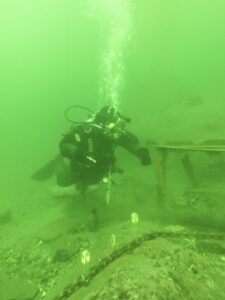
© Andreas Pietzcker
Lastly we trained on using Scuba gear and the Interspiro mask. This is the equipment used mostly by firemen and rescue divers and we practiced search patterns for lost objects (we had a chain and, of course, a gun), rescuing an unconscious diver, did inspection dives and cleaned the hull of the dive vessel Buldra, where we had started to dive all the way back in November.
It sounds crazy but diving into freezing water with equipment that weighs nearly as much as you do, is an amazing and fun experience. It is truly something extraordinary, the feeling of floating weightlessly in the water or walking with lead boots along the seabed like the astronauts on the moon.
Diving is a team effort and I was priviledged to work with some amazing, caring and professional individuals during this four month stay. We grew together as a group and took care of each other.
Every day there were new challenges and new things to learn and new experiences, so every morning I was glad to go there. And in the evenings we met, cooked and laughed together, watched movies, had barbeques or went out to Oslo to party.
There are so many different aspects to diving that it is hard to put into words but in essence it is a gateway to a truly unique world where adventures await. I will never forget the time I spent in Norway nor the lessons that I have learned and I am hoping that this will just be the beginning of an incredible journey. I want to thank Erasmus for giving me this opportunity and I will cherish these memories for a long time.
My Internship in Istanbul at Agaoglu Enerji
- Civil Engineering B.Sc.
- Turkey, Istanbul
- Agaoglu Enerji
- 10/2024 – 01/2025
Preparation
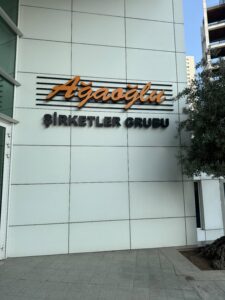
Logo of the Company ©Ebu Talip Osta
I had originally planned to spend a semester abroad in Istanbul. The idea of studying in this fascinating city for a while really appealed to me. However, after careful consideration, I decided to do an internship instead in order to gain practical experience in my field. I received support from my family in my search for a suitable company. Several companies that came into question were suggested to me and I began to investigate them more closely. It was particularly important to me that the company was active in the field of renewable energies and would provide me with valuable practical insights. After a lot of research, I finally chose Agaoglu Enerji. The company impressed me with its wind and solar energy projects and its innovative approach. Once I had made my decision, I was put in touch with the company and officially applied for the internship. After a successful application process, I was accepted and was able to start my internship in Istanbul.
Accommodation & living expenses
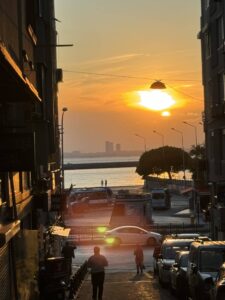
Kadiköy, Istanbul ©Ebu Talip Osta
I used Facebook groups, ESN WhatsApp groups and the Sahibinden app to find an apartment.What was important to me was a fixed-term tenancy agreement and the opportunity to view the apartment in advance. The location also had to offer good connections to work and leisure activities. In the end, I found an apartment in Kadıköy, a popular neighborhood for young people and students. The location was perfect – I had quick access to public transport and was able to spend my free time in a variety of ways. The cost of living in Istanbul is generally cheaper than in Germany, but varies depending on where you live and your lifestyle. While rents are higher in central districts, food, restaurants and public transport are comparatively inexpensive. Overall, I was able to live well and enjoy my time in Istanbul with a well-thought-out budget.
Everyday life / the internship
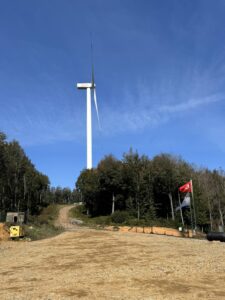
Wind turbine ©Ebu Talip Osta
My everyday life in Istanbul was an exciting mix of work and leisure. During the week, my day started early as I made my way to work at Agaoglu Enerji. Thanks to the good connections from Kadıköy, I got to the office quickly. My working days were varied – I dealt with project planning, data analysis and the technical implementation of wind and solar projects. The exchange with colleagues also played a major role and I was able to learn a lot from their experiences. I also took part in construction site visits to follow the progress on site.
After work, I used the time to explore the city or meet up with friends. Sometimes we went out to eat, had tea in one of the many cafés or walked along the Bosphorus. Some days I played soccer with my work colleagues, which was a great way to get to know the team better.
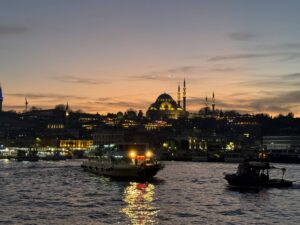
Bosphorus ©Ebu Talip Osta
At the weekend, I used the time to discover more of Istanbul. I visited famous sights, tasted the diverse Turkish cuisine and got carried away by the hustle and bustle of city life. I also stayed active in sports – sometimes I met up with friends to play soccer or for other leisure activities.
The mixture of professional experience and cultural adventures made my everyday life in Istanbul particularly exciting and enriching. Not only was I able to learn a lot of new things, but I was also able to enjoy life to the full in one of the world’s most fascinating metropolises.
Free time / Tipps
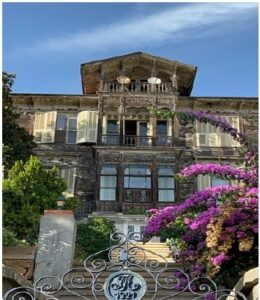
Princes Island ©Ebu Talip Osta
There are countless leisure activities in Istanbul that make the city an exciting experience. During my time there, I was in an ESN WhatsApp group that regularly offered current events and various trips to other cities. This was a great way to get out of the city and discover new places while keeping in touch with other Erasmus students.
A particular highlight is the ferry to Bursa. There you can explore the charming city and take the ropeway up to Uludağ, where you can not only enjoy a breathtaking view but also get some fresh mountain air.
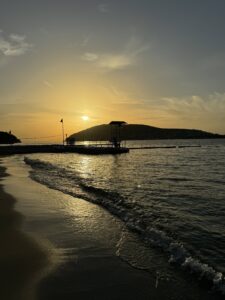
Princes Island ©Ebu Talip Osta
Destinations such as Eskisehir or Ankara, which you can easily reach by express train, are also ideal for a weekend trip.
You can also discover quiet places in Istanbul itself. With a slightly longer journey by train and bus, you can reach beautiful forests and beaches that are ideal for escaping the hustle and bustle of the city and relaxing in nature. The princes islands, which you can reach by ferry, are also highly recommended. They are a perfect destination, especially in summer weather – you can explore the islands and go swimming there to enjoy the sun and the sea.
Conclusion
The internship at Agaoglu Enerji was a very valuable experience that not only benefited me professionally, but also personally. I was able to apply my theoretical knowledge from my studies and at the same time gain new insights into the practical implementation of wind and solar projects. The close collaboration with experts and the opportunity to work on real projects was particularly exciting.
Living in Istanbul was also an unforgettable experience. The city is full of life, history and culture and offers countless opportunities to discover new things. Despite the initial chaos, I quickly got used to life there and really enjoyed the diversity of the city.
Both the professional and cultural experiences will leave a lasting impression on me and
are a valuable asset for my future academic and professional career.
My practical year in Montpellier
- Medicine
- France, Montpellier
- Centre Hospitalier Universitaire (CHU) de Montpellier
- 07/2024 – 10/2024
1. Application/Finding an Internship
From an early stage, it was clear to me that I wanted to complete a substantial part of my practical year, my medical internship, abroad. After planning my first rotation in Dubai and having my second in Germany, I wanted to see and experience something different for my third rotation. I chose to take another challenge: general surgery in Montpellier, Southern France. The application process was relatively straightforward; I sent an email to the head of the department in early 2024, and my application was quickly accepted. Further organization was handled through the universities in France and Germany. The process in France was similar to that in Germany, requiring vaccination records, certain health tests, and proof of insurance. Thanks to EU agreements, I didn’t have to worry about obtaining a visa.
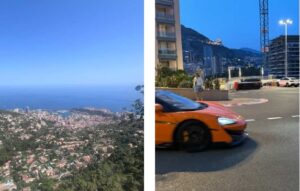
Monaco (left) and the Fairmont Hairpin Curve (right) ©Julia-Laura Schulz
Further planning included my travel arrangements and accommodation. I combined my journey with my family as a little road trip through Switzerland, Italy, and Monaco. For accommodation, I recommend student dormitories, but it is important to note that not all of them accept short-term stays, especially those that span multiple semesters. While I found it easy to secure accommodation for the semester holidays at the start of my internship, I had to move at the beginning of the new semester. Finding new accommodation was quite stressful and not easy, given my work routine and studies. However, in the end, everything worked out.
2. Accommodation & Living Expenses
During my internship, I opted for student housing, which offered a more affordable living option compared to private apartments. The costs for living in Montpellier were manageable, especially considering the financial support I received. I found that groceries were reasonably priced, but dining out could become expensive.
The student dormitories offered essential amenities, such as kitchen facilities, allowing me to cook my own meals, which helped keep my expenses down. While I didn’t strictly budget, I was mindful of my spending since I also wanted to indulge in the local cuisine and travel during my free time. Overall, Montpellier is a vibrant city, and the cost of living was reasonable for a student lifestyle.
3. Everyday Life/The Internship
On the first day of my internship, I registered at the medical faculty next to the hospital, where I enrolled alongside other Erasmus students. I then went directly to the General, Visceral, and Transplant Surgery department, known as “Chirurgie B.” The senior physician responsible for externes showed me around the unit and explained the processes. In France, medical students are referred to as “externes,” while resident doctors are called “internes,” which can be confusing at first, as “interns” in English usually refers to final-year medical students. Our team typically consisted of three German and two French students. The French externes usually rotate every few weeks, which allowed me to meet many different people.
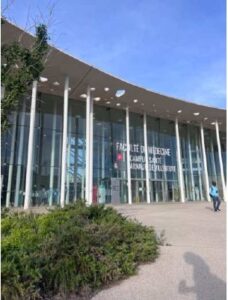
Faculty of Medicine ©Julia-Laura Schulz
Each week, we were assigned to a department, which could include the ward, the operating room, or outpatient clinics. Depending on our interests, we also had the opportunity to rotate through radiology, endoscopy, and anesthesia. Additionally, we had one to two on-call shifts each week (including weekends) for liver transplants. A typical day began with the morning handover from the night shift and a round of visits to all patients on both the general and intensive care wards. After the handover, everyone focused on their own tasks. Once a week, usually on Fridays, there were classes for students, often in the form of OSCE exercises. These sessions were highly educational, although the language barrier sometimes created a tense, exam-like environment. After the classes, the entire team would gather to review and discuss the surgical schedule for the upcoming week, deliberating on various cases. During these discussions, both attending and senior physicians often posed questions to both internes and externes. Additionally, once a month, the internes gave presentations, which were followed by the big weekly rounds.
The general ward was structured similarly to those in Germany, consisting of double and single rooms. The intensive care unit primarily had single rooms, and the operating rooms were comparably designed. Access to various areas of the hospital was secured with access codes. Both internes and externes had a dedicated room on the ward equipped with computers and lockers. All externes received a personal account for the duration of their stay to access computers and the hospital information system.
A particular highlight in Chirurgie B were the liver transplants. During the 24-hour on-call shifts, the ones on-call were responsible for these procedures and had to be prepared to stand in the operating room for about eight hours straight. There was also the opportunity to voluntarily participate in organ retrieval, which often involved traveling to different locations or even flying by private jet. On one occasion, we were escorted by the police, which felt like a movie and was incredibly exciting. The retrieval process is very moving and deeply impressive, as it represents the final and selfless act of brain-dead patients. After retrieval, the liver is transported in a cooled state and appears gray; however, after several hours of surgery and restoration of blood flow, it regains its dark red color. This moment is magical and makes all worries, back pain, and fatigue fade away.
One challenging aspect was the work environment in the department. There was often a tense atmosphere among the resident doctors, which sometimes affected us externes. This led to conflicts between internes and externes, causing misunderstandings with the attending physicians and resulting in stricter oversight. However, thanks to the camaraderie among the externes, this was manageable.
I also wanted to gain insight into neurosurgery, so I contacted the chief physician, who invited me to observe a particularly interesting procedure: an awake brain surgery. The patient underwent head surgery and was awakened for about an hour during the procedure with the assistance of neuropsychologists, who guided her to perform various tasks in order to minimize the risks associated with the surgery. Since I have a strong interest in neurosurgery, this was definitely one of my personal highlights at the clinic.
Despite the initial language barrier and different dialects, I quickly settled in and was able to learn a lot. I observed procedures that I had only previously studied in theory. The awake surgery and the liver transplants were undoubtedly extraordinary experiences that left a lasting impression on me. I would like to extend a special thank you to my colleagues, whose support made the stress of the internship much more bearable. Moreover, the opportunity to forge international connections and broaden my horizons was particularly valuable.
4. Free Time/Tips
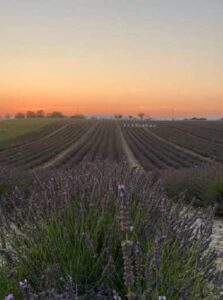
Lavender Fields, Provence ©Julia-Laura Schulz
From the beginning, I met many nice people. After work, we often arranged to meet for dinner, take weekend trips, go canoeing, or even play mini-golf together. A particularly memorable trip was to the lavender fields in Provence, which were breathtakingly beautiful. Watching the Euro football matches together was another unforgettable experience 4 especially the public viewing when France was playing, which created an incredible, lively atmosphere. We also went on trips with the Erasmus group, including horse riding in the Camargue, which was a unique way to explore the region. Numerous wonderful moments were created, and I have many pictures that I enjoy looking at repeatedly.
To pursue my passion for golf, I joined a golf club in Montpellier, where I regularly participated in courses. I met many other golfers, but since this was my last internship rotation, I also had to study for the third state exam, which meant sacrificing some of my free time. During this time, I discovered the university libraries, which I also liked.
The location of Montpellier allowed me to take many trips across Southern Europe. For example, I was able to meet friends in Barcelona or pick up my cousin from her language course in Nice. A particular highlight was our family reunion in Venice for my mother’s birthday, where family members from the USA, the Dominican Republic, and Germany came together. It was wonderful to see the surprised faces of my relatives when they saw us there.
Another delightful moment was when friends from Germany visited me, and we spent a wonderful week together. We explored the city, enjoyed the local cuisine, and shared many unforgettable moments.
On Sundays, I attended mass at various Catholic churches around the city, including the cathedral. Following the mass in French wasn9t always easy, but reading the liturgy beforehand in both German and French helped me follow along more easily and gain more from the sermon.
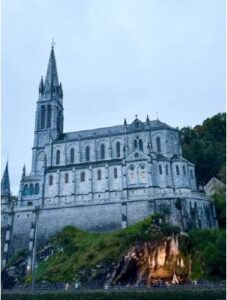
Lourdes ©Julia-Laura Schulz
For my return journey, my family picked me up, and we drove back via Lourdes and Paris. The Rosary procession and the water ritual formed a meaningful and memorable conclusion to my internship.
5. Conclusion
In conclusion, I can confidently say that the last rotation of my internship abroad was a complete success. I learned not only a lot professionally and linguistically but also gained numerous experiences, impressions, and valuable contacts. Montpellier taught me so much, and this experience will stay with me forever. Therefore, I would like to sincerely thank the Erasmus+ internship program for their support, which, along with my family’s assistance, made this stay possible. If you have any further questions, I am happy to help. Thank you!
Writing my Master Thesis in Trondheim
- Chemistry M. Sc.
- Norway, Trondheim
- Norges Teknisk-Naturvitenskapelige Universitet
- 07/2024 – 01/2025

Figure 1: Cross-country skiing on Finsevatnet in Finse, mid-January. ©Julia Wang
Preparations
People often ask for the reason I chose Norway: Initially, I planned to do an internship in Sweden and then return to Germany for my thesis. Unfortunately, I lost contact to my Swedish prof, and as time was running out, I finished all required internships in Germany. However, I struggled to find a suitable thesis topic, so I decided to write it externally, including universities from countries in Ireland and Scandinavia in my search. I wanted to improve my English skills and also experience a place full of nature I have never been to before. As the nature in Ireland, Sweden, Norway, and Finland is beautiful, I ultimately found that Norway was the best fit for me. It offered a fascinating language but still with the comfort to speak English anytime, stunning landscapes, beautiful nature, a vibrant student city, and an exciting thesis topic.
I came across the topic of my thesis by proactively reaching out to professors working in areas I found particularly intriguing. As a chemistry student, I was often dissatisfied with the specializations at my university, so learning that Norway has a strong focus on environmental chemistry caught my attention. After a response from a professor, we had a brief meeting where he introduced me to a project based within the Arctic Circle, combining environmental chemistry with fundamental research. The process of signing the OLA was incredibly slow, but once that was finalized, there was nothing standing between me and my successful thesis – well, except for one thing: accommodation.
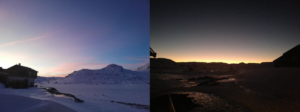
Figure 2: Stunning sunset in Finse, mid-January. ©Julia Wang
Accommodation & Living expenses
Overall, Norway is more expensive in nearly everything, which makes sense given their higher income. Usually, it is possible for exchange students to apply for student dorms (e.g. at Moholt). Those are particularly nice because of the large student communities that make it easy to meet new people. However, since I arrived in the winter semester – when most new local and exchange students come – the dorms were fully booked. As an internship student from Europe, I wasn’t automatically eligible for housing, so I had to request dorm accommodation. Even then, priority is typically given to international students from outside Europe and those attending summer courses at NTNU.
Thus, I ended up looking through the private housing market. Luckily, I found a room in a Norwegian student’s flatshare that was subletting for the exact duration of my stay. The flatshare with 4 people was comparably affordable and with 5300 NOK (everything included) even cheaper than the dorms. My place was located near Solsiden, which wasn’t exactly close to the university, but the area was well-connected by buses. It was also closer to the city center, as Tyholt and Moholt were about a 25-minute bus ride away. Personally, I preferred cycling since it is faster, cheaper, and the terrain was less steep compared to Gløshaugen-Moholt, which was a nice bonus.
As for the general living expenses, being a vegetarian made it a bit challenging to find affordable fresh vegetables, as everything tends to be more expensive and often heavily packaged in plastic. However, you get used to the prices after a while. As someone who loves tofu, I found it difficult to find good, firm Asian-style tofu. Common supermarket chains include Rema1000, Bunnpris, and Coop Mega for cheaper options, while Kiwi and Meny are more expensive. There are also online discounts and QR codes that offer discounts on specific products, and it’s helpful to ask around in ESN groups, as they often share these codes. I also found myself visiting Asian markets, like NM Market for the best deals on rice, soy sauce, and paneer at Melon Midtbyen. In general, products with higher fat, sugar, or imported goods were about twice as expensive as in Germany. However, Norwegians tend to offer larger packaging, which can help reduce the price per unit.
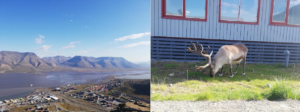
Figure 3: Parts of Longyearbyen and the Adventfjorden from the Varden viewpoint (left) and Svalbard reindeer in the middle of town (right). ©Julia Wang
Everyday life/the internship
Since I was doing my master thesis, my workload was higher compared to an average exchange student. I did miss out a bit on some activities since I was less flexible and had less free time. However, Norwegian work culture is much more chill and laid back than back in Germany. Nobody will ask you to come early and nobody cares if you leave early. Therefore, you need even more discipline to stay on track. Typical work hours in Norway are from 8am to 4pm. Afterwards, people head home for dinner. Many shops also close around 4 or 5 pm, so it’s a good idea to check their hours in advance to plan accordingly.
My thesis involved a field trip to Svalbard in mid-August, where I collected samples, spent time in the lab back In Trondheim, and then focused on writing the thesis. The working groups at NTNU are pretty small, so it is easy to get an overview but I rarely met everyone at once. Knowing how close people work together in working groups in Germany, sometimes I felt a bit lonely and disconnected from PhD or master students. However, I also enjoyed the independence I had to plan my own research, discuss it with my professor (who, by the way, dedicated a lot more time to me than the average professor in Germany would for a master’s student), and work closely with my supervisor. I also enjoyed the flexibility in how I structured my daily work and writing process.
In the evenings, I usually took part in various free-time activities including choir, anime screenings, board games, swimming, 3D printing, sewing, knitting, or baking. On weekends, I usually met up with friends, did my chores, or went on hikes and trips around the area. Sometimes, and further. With a bit of planning, you can easily bring your work with you, as many trains offer Wi-Fi! That way, you can explore places like Åndalsnes, Bergen, Finse (!!!), and more.
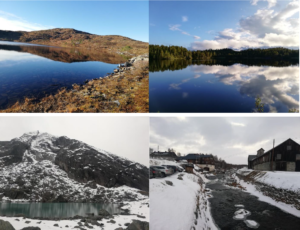
Figure 4: Stunning lakes and rivers found during hikes across Norway. Grytvatnet is found close to Vinjeøra, (upper left), Stordamvatnet is close to Lundamo (upper right), Hurrungsvatnet is near Åndalsnes (bottom left), and the Glomma river runs through Rørøs (bottom right). ©Julia Wang
Free time/tips
Trondheim is a big student city, so you will find all kinds of people. While connecting with international students was quite easy, since everyone is desperate to find friends, I was more interested stepping outside the Erasmus bubble and meeting Norwegians. And the stereotype holds true: While Norwegians are friendly and somehow open to start a conversation, there can still be a sense of distance. Personally, I’ve never been the most social or chatty person, so I always struggled to form deeper connections with anyone. That said, living with Norwegians and joining Norwegian clubs really helped me engage more with locals.
Norway is known for its stunning and beautiful nature (northern lights, midnight sun, mountains, fjords, lush green forests wherever you go!) and almost all Norwegians are big sports enthusiasts. NTNU has a student organization called NTNUI, where you can sign up for various sports clubs. Its very close to what American sports teams are like. People are competitive and passionate about their activities. If you want to try something typical Norwegian: You can join a group that teaches halling, a traditional Norwegian dance, or even take up sword fighting through another separate group.
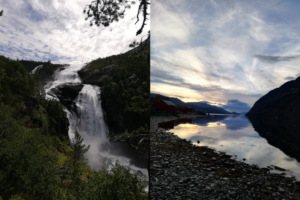
Figure 5: Because scenary with water is so beautiful: The stunning Nyastølfossen is found close to Kinsarvik on a 3-4 waterfall hike (left) and the beautiful sunset over Vinjefjorden can be observed in Vinjeøra (right). ©Julia Wang
If you are not into sports, there are still many student groups you can join: As for me, I joined a group called PVV for board games and anime. In general, they have a different focus but they also offer great social activities. I also joined a choir (NTNU motettkor), conducted by one of Norway’s most famous conductors and a group of Norwegian music students. The group was a fun mix of exchange students and locals, and the conductor was incredibly motivating, making it a truly enjoyable experience. Another popular hobby in Norway is knitting, with knitting events often hosted at cafés or yarn shops. It’s a relaxing activity, especially on those cold, rainy days. I also had the chance to learn 3D printing and practice sewing at the MakeNTNU workshop, where you can book time on a machine to create whatever you like (They are getting new printers, finally!!).
Another great place that offers cool events is the student building down the road from the technical university building: Studentersamfundet. It is definitely worth a visit, as they offer concerts, talk shows, discussions, I addition to having restaurants and more.
As for Trondheim, nature is incredibly accessible. You can enjoy small walks along the coast to the fjord in Lademoen, hikes in Estenstadmarka to the southeast, or head to Bymarka to the west. In winter, Bymarka is perfect for cross-country skiing. For bigger adventures, the ESN group organizes trips to Lofoten, Lapland, and other places. Otherwise, it is advisable to form small groups and rent a car to get around, especially in winter. While many people opt for Airbnbs, I highly recommend trying the great network of cabins in Norway! NTNUI Koiene have basic cabins around Trøndelag but personally, I suggest going for the DNT cabins as they are more spacious and comfortable.
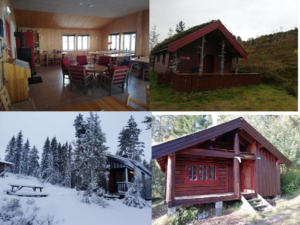
Figure 6: The common room in the DNT Brebua cabin in Finse (upper left), the DNT Venjedalsbu cabin close to Åndalsnes (upper right), a private cabin at Bymarka close to Ringvål (bottom left), and the Flåkoia NTNUI cabin near Lundamo (bottom right). ©Julia Wang
Conclusion
If you are an outdoor enthusiast who enjoys nature and want to experience a new culture during your internship or your thesis with excellent supervision and a nice work environment, I definitely recommend Norway. Not only did I gain insight into the country and its people, but I also embraced a new way of living my life while staying productive. There are plenty of opportunities and activities that allow you to connect with others. You just have to step out of your comfort zone and start engaging people!
I hope you enjoy your time here as much as I did if you choose Norway.
P.S. Yes, it does get pretty dark and depressing from November to February (Average daylight around 5h in Trondheim). But trust me, the experience alone is worth it. Plus, the midnight sun and longer days in summer make up for it!
My Internship at an Architectural Office in Vienna
- Architecture M. Sc.
- Austria, Vienna
- Jadric Architektur ZT GmbH
- 09/2024 – 11/2024
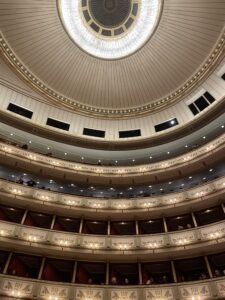
© Selina Maria Pick
My Erasmus+ internship in Vienna was an unforgettable experience that gave me both professional growth and cultural enrichment. From the very beginning, it was a journey filled with excitement, opportunities and memorable moments.
Finding the internship was relatively straightforward. I applied online to a small architecture firm with five employees and was lucky to receive a direct offer after an online interview. The team was incredibly welcoming and the atmosphere at work was open and familiar. We always took breaks together, which helped me integrate into the group quickly and feel like a valued member of the team. Since the team was international, we spoke exclusively English at work. This not only created a collaborative and inclusive environment but also allowed me to enhance my professional English skills, especially in areas like technical terminology and day-to-day communication.
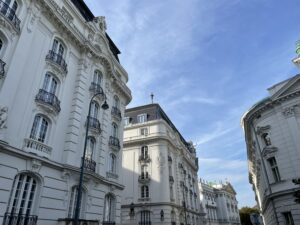
© Selina Maria Pick
To find an accommodation in Vienna, however, was more challenging. I searched for a room to sublet via WG-Gesucht.de and found the housing market to be quite competitive, but with persistence and a bit of luck, I managed to find a room in a shared apartment. It was a beautiful old-style building in a central location, which made exploring the city easy and enjoyable. Living with three roommates added to the experience, as we often shared meals and made trips through the city. While rents in Vienna are relatively affordable, everyday living costs were slightly higher than in Germany, though prices in bars for example were similar or even slightly lower.
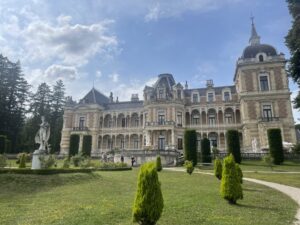
© Selina Maria Pick
My everyday life revolved around the internship and exploring the city. At work, I had the opportunity to engage with a variety of tasks and learn from experienced professionals. The close-knit team created a supportive environment that allowed me to grow both creatively and technically. Outside of work, Vienna offered a wealth of cultural activities and countless opportunities for exploration. From visiting museums and historical landmarks to discovering cozy bars and cafes, there was always something to do. One common stereotype about Viennese people is that they can be at times rather unfriendly, but my experience was the opposite. I found people to be open and approachable, especially once you started a conversation. This friendliness made navigating a new city much easier and helped me feel at home.
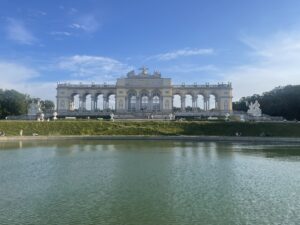
© Selina Maria Pick
For anyone considering an internship in Vienna, I recommend making the most of the city’s rich cultural scene. Don’t miss out on the chance to visit exhibitions and historical buildings, enjoy traditional Viennese coffee houses and relax in the many green spaces the city has to offer. Vienna is also well-connected, making it easy to take weekend trips to other parts of Austria or nearby countries.
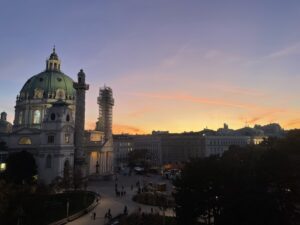
© Selina Maria Pick
In conclusion, my internship in Vienna was an enriching experience that I would recommend to anyone considering doing an internship abroad. The combination of professional development, cultural exposure, and personal growth made it a truly unique opportunity. If you embrace the challenges and immerse yourself in everything the city has to offer, Vienna will leave a lasting impression on you.
My Research Stay at the University of South Carolina Upstate
- PhD Candidate in Business Economics
- USA, South Carolina
- University of South Carolina Upstate
- 09/2024 – 11/2024
Preparation
I had been a PhD student at RWTH Aachen for a few years and working abroad had always been something I’d like to do. As part of my research, last year I had the opportunity to start collaborating with a professor from the University of South Carolina Upstate. When I asked for the possibility to visit the US and work together from there, she was on board immediately. So, the planning began…
Planning a trip to the United States is definitely an administrative task, and I quickly realized that I had to take it step by step. After settling on a rough timeframe with my PhD supervisor and my hosting professor, I contacted the travel department of the university and booked my flights to and from the US. Talking to colleagues who had already been abroad and looking up to-do lists online was very helpful to figure out what steps to take, e.g. requesting a letter of confirmation from the host university or getting an international license. I started the organization process half a year before my stay, which was a convenient timeframe to organize everything.
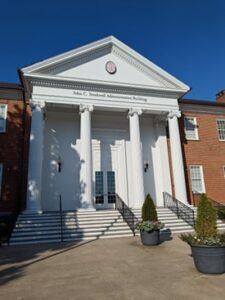
Main building of the University of South Carolina Upstate. ©Maren Paegert
Accommodation & Living Expenses
Living expenses in the US are higher than in Germany, especially food prices. Eating out will cost around $ 20-30 for one meal. Grocery prices can be two to three times as expensive as in Germany, even for things like bread, a package of cheese, or some chocolate. This is just something to know and budget for. For my stay, I applied for and got granted the RWTH Aachen Research Ambassador Scholarship, which helped in covering some of those expenses.
As for my accommodation, I ended up booking an apartment in a complex which was specialized in short-term leases for extended business stays. I would recommend to book directly over the apartment’s website, since I experienced a cancellation several days after booking over a third-party platform. Other good options for a stay in the US are Apps such as Airbnb. In my case, there was no student housing available, but that would be another option in general.
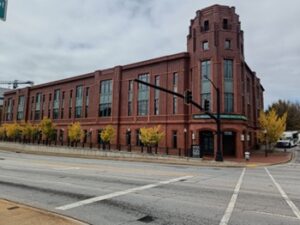
College of Business and Economics. ©Maren Paegert
Everyday Life and Research Stay
I had my own office at the guest university and was able to experience everyday working life in the United States. Overall, working as Academic staff in the US is quite similar to Germany in many ways, with some cultural differences.
Also, I stayed in one of the Southern States of the US, and Southern hospitality is something I definitely experienced! Everyone was very friendly, open and attentive, which I enjoyed a lot. The professor I worked with was a great host, and I quickly met some amazing colleagues. The area offered a lot of places to explore, and I enjoyed walks in the park, going out for meals, shopping, the cinema, going to the gym, and running. One of my favorite experiences is that I was able to give my own lecture at the university and get into contact with many very curious students.
Another highlight was the last week of my stay, when we attended a conference in Virginia and I presented our research there. Overall, meeting an international community and collaborating was a very rewarding experience.
Conclusion
I can highly recommend to work or study abroad for a while. If that has been on your bucket list for some time, like in my case, be proactive and just do it!

